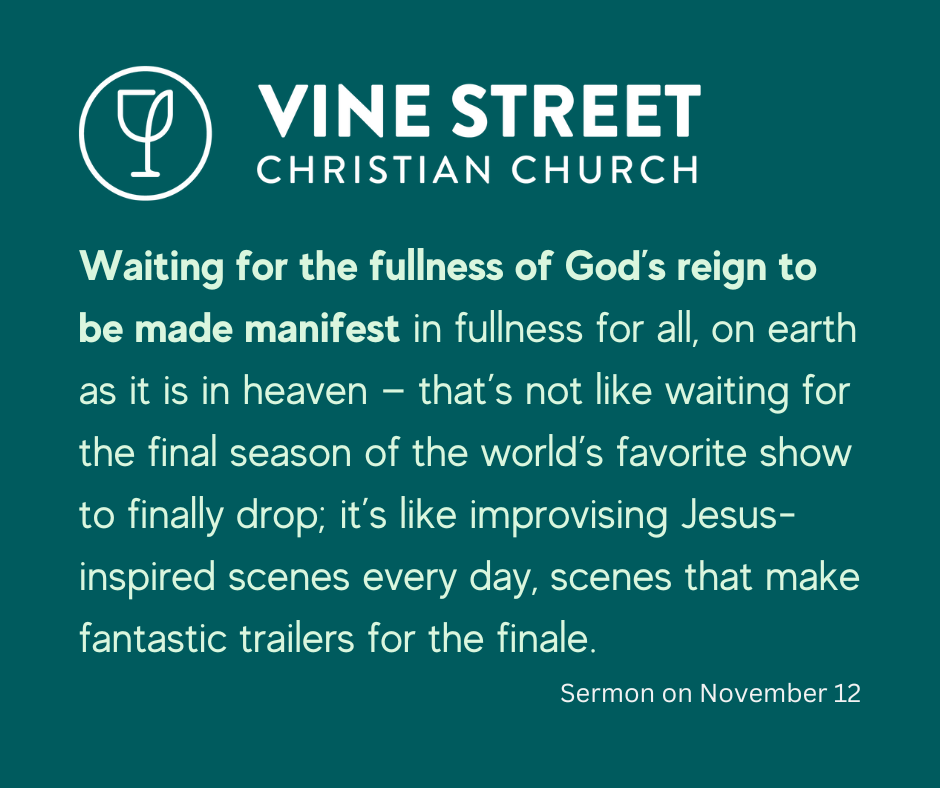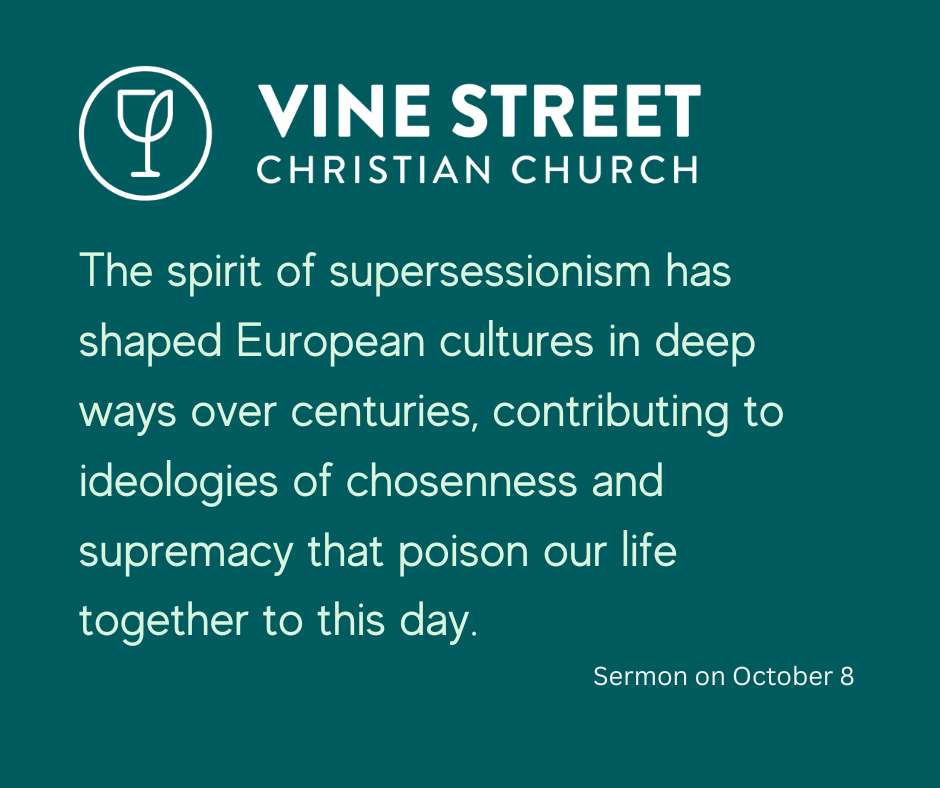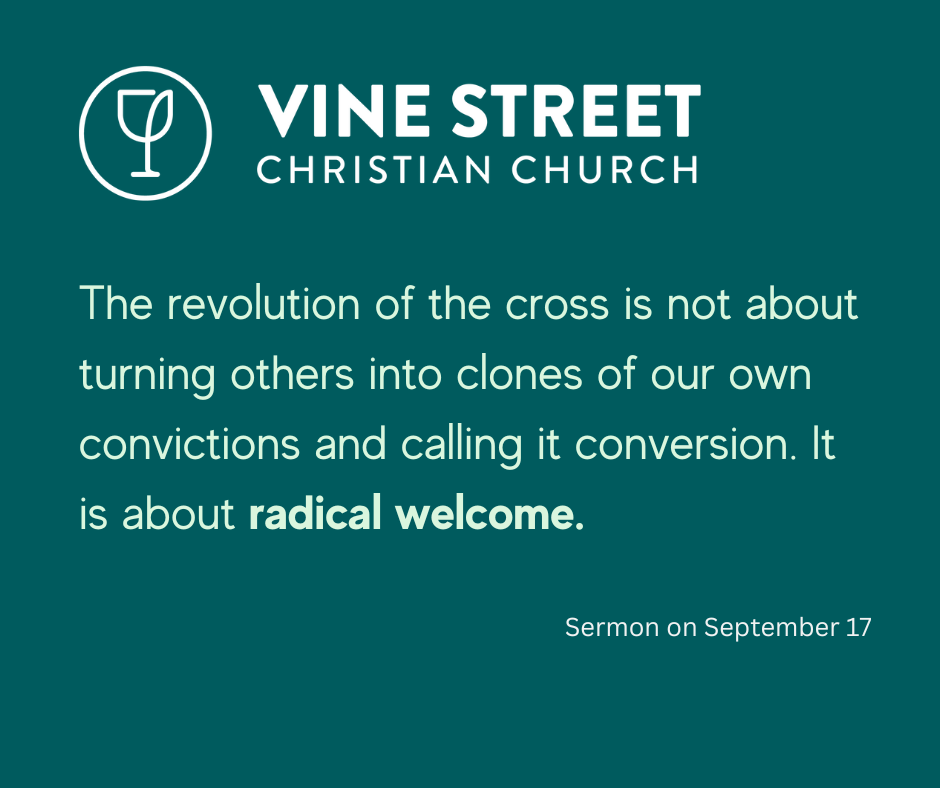Thomas Kleinert
Last Sunday, we closed our worship service with a hymn of quiet expectation:
O day of God, draw nigh
in beauty and in power;
come with thy timeless judgment now
to match our present hour.
We sang, O day of God, draw nigh — though earlier in the service, in a reading from the book of Amos, we had heard a warning:
Woe to you who desire the day of the Lord! Why do you want the day of the Lord? Is not the day of the Lord darkness, not light, and gloom with no brightness in it?[1]
And yet we sang of our desire for that day:
Bring to our troubled minds,
uncertain and afraid,
the quiet of a steadfast faith,
calm of a call obeyed.
Bring to our world of strife
thy sovereign word of peace,
that war may haunt the earth no more,
and desolation cease.
We sang, grateful for the gift of words for our trouble, our fear, and our longing. In Amos’s day, some people in Israel, the northern part of the divided kingdom, particularly among the elite, were fond of invoking the day of the Lord, that great day when the divine warrior would bare his holy arm and defeat Israel’s enemies. Apparently it never occurred to them, that they themselves might be on the receiving end of God’s holy rage against their disobedient and oppressive ways.
“I hate, I despise your festivals, and I take no delight in your solemn assemblies,” Amos shouted, giving voice to God’s anger.
Take away from me the noise of your songs; I will not listen to the melody of your harps. But let justice roll down like water and righteousness like an ever-flowing stream.
In the society of widespread oppression they had created, their festive worship, though religiously presented, was no fragrant offering of praise but only ugliness, noise and stench, the prophet declared. What they called worship wasn’t worship at all, but an expensive celebration of religious fantasies. Folks in Samaria, capital of the northern kingdom, came to the sanctuary bearing gifts, looking sharp, and smelling good, but nothing covered the rot underneath.
“You trample the head of the poor into the dust of the earth,” Amos cried. “You push the afflicted out of the way, you oppress the poor, and crush the needy. You hate the one who reproves in court and abhor the one who speaks the truth. You trample on the poor, afflict the righteous, and push aside the needy at the gate.”[2] You may think of yourselves as worshipers of the Lord, but you are tramplers, pushers, and crushers.
Liturgy in the absence of justice does not please God; it nauseates God.[3]
Woe to you who desire the day of the Lord! Why do you want the day of the Lord? Is not the day of the Lord darkness, not light, and gloom with no brightness in it?
In 721 BCE, Samaria and the northern kingdom were defeated and became part of Assyria. Jerusalem and Judah, the tiny southern kingdom, sought ways to thrive in the shadow of Assyria to the north and Egypt to the south, and about a hundred years later, when the two regional superpowers showed signs of decline, King Josiah and a group of reformers saw an opportunity to push for greater political independence and renewed obedience to the God of Israel. That’s when Zephaniah addressed the Jerusalem leadership, and he expanded Amos’s critique of the misplaced confidence and joyful anticipation of ‘the day of the Lord.’ Rather than a day of rejoicing, it would be a day of deep anguish, because the people of Jerusalem and Judah, in their disobedience to the commandments demanding loyalty to God and neighbor, had broken the covenant and shown themselves to be enemies of God. And in Zephaniah’s view, much more is at stake than the wellbeing of a small nation when God’s covenant people confuse their religious fantasies with the worship of God, creator of heaven and earth. The collection of his oracles in the book bearing Zephaniah’s name begins with the undoing of creation:
I will utterly sweep away everything from the face of the earth, says the Lord. I will sweep away humans and animals; I will sweep away the birds of the air and the fish of the sea. I will make the wicked stumble. I will cut off humanity from the face of the earth, says the Lord.[4]
Worship of the Lord in justice and righteousness, according to the prophet, is part of the created order itself, and without it, life on earth is not only diminished, but utterly swept away. Compared to our ancestors, we may hesitate to ascribe human emotions like jealousy and wrath to God, but we are in a position to know better than any generation before us, that our idolatries cause suffering across the whole web of life, in all the relationships between land, sea, forests, weather systems, animals, plants, and humans.
Today’s passage from Zephaniah takes us to the temple, and we hear a call to worship: Be silent before the Lord God, for the day of the Lord is at hand!
The call announces a day of sacrifice, only here the inversions, perversions, and confusions of human idolatries repeat and reveal themselves in a complete reversal of roles: God is the priest making sacrifice. The people of Judah are the implied sacrificial victim, and the guests invited to the appalling feast are the designated armies of destruction.
Some see this scene, including the slaughter of people, as a clever role reversal in a temple setting — I cannot bear the obscenity. Zephaniah’s words cannot support the weight of the wrath, distress, anguish, and devastation they are intended to mean, and thick darkness and gloom cover not only the scene but also the heart of the reader. With wars raging and people being slaughtered in Ukraine, in Sudan, and in the land Palestinians and Jews call home, and in the places that barely make the news, the vocabulary of Zephaniah’s ‘day of the Lord’ together with the cries of the dying, the broken, and the orphaned — and note that we do have a name for a child whose parents have died, but not for a father whose child is no more or a mother whose child has been abducted — these words and these cries do not illustrate the prophet’s clever use of ritual conventions in his proclamation of divine judgment. They confront us with reality. They show us the hideous trajectories of our idolatrous habits. Can they shock us into recognition? Can they wake us from slumber?
Yet even for Zephaniah, who saw the whole creation at stake in the ways a city honored God’s covenant demands or not, even for Zephaniah, the Day of the Lord did not represent the end of the world, but the possibility of a new future of faithfulness. The first chapter ends with the words, “In the fire of [the Lord’s] passion the whole earth shall be consumed, for a full, a terrible end he will make of all the inhabitants of the earth.” And yet, only three verses into the next chapter, the prophet writes, “Seek the Lord, all you humble of the land who do his commands; seek righteousness, seek humility; perhaps you may be hidden on the day of the Lord’s wrath.”
Perhaps opens a window in the thick darkness of wrath, an opening for light to enter and provide shelter. And that hopeful, humble perhaps becomes a bold because in the proclamation of Paul. “You know very well that the day of the Lord will come like a thief in the night,” he tells believers in Thessalonica. Those who say, “There is peace and security,” will be surprised, he tells them. “Peace and security” was a Roman slogan, stamped on Roman coinage to remind people that imperial power was the true source and guarantee of the world’s peace and security. Roman power presented itself as irresistible, inevitable, and, of course, divinely ordained, but the followers of Jesus lived in the world that Rome had made as citizens of the world to come. No matter how loudly the emperor cult declared Caesar to be Lord, they knew that the true Lord was coming, and Paul reminded them that his coming was inevitable, like labor pains, and unknown, like the arrival of a thief in the night. Only to them, Jesus’ coming wouldn’t be at all like a thief breaking in at night, because they were living in the day. For them, the night had ended and light had penetrated the thick darkness when God raised Jesus from the dead. And they belonged to Jesus.
Followers of Jesus are living in the day, because with Jesus risen from the dead, it’s a whole new world. Followers of Jesus are living as children of the day, because with Jesus risen from the dead, we are new people. The light of Christ is forever part of who we are. We don’t look to the Day of the Lord with fear, because for us it’s the culmination of the life we are already living.[5] Because we belong to Jesus, because he died our death, we live his life of complete obedience to the demands of covenant faithfulness – we practice obedience, we seek righteousness, we seek humility, and we leave the completion to him. We follow Jesus, confident that God has destined all of us not for wrath but for salvation through Christ — and if all of us, then indeed all of creation. And so we sing, O Day of God Draw Nigh, because the light of the world is risen and already shining in a million places. And we sing, All My Hope on God Is Founded.
[1] Amos 5:18,20
[2] See Amos 2:7; 4:1; 5:10,12.
[3] Nicholas Wolterstorff, “Justice as a condition of authentic liturgy,” Theology Today, Vol 48.1, 10.
[4] Zephaniah 1:2-3
[5] See Amy Peeler https://www.workingpreacher.org/commentaries/revised-common-lectionary/ordinary-33/commentary-on-1-thessalonians-51-11-5





